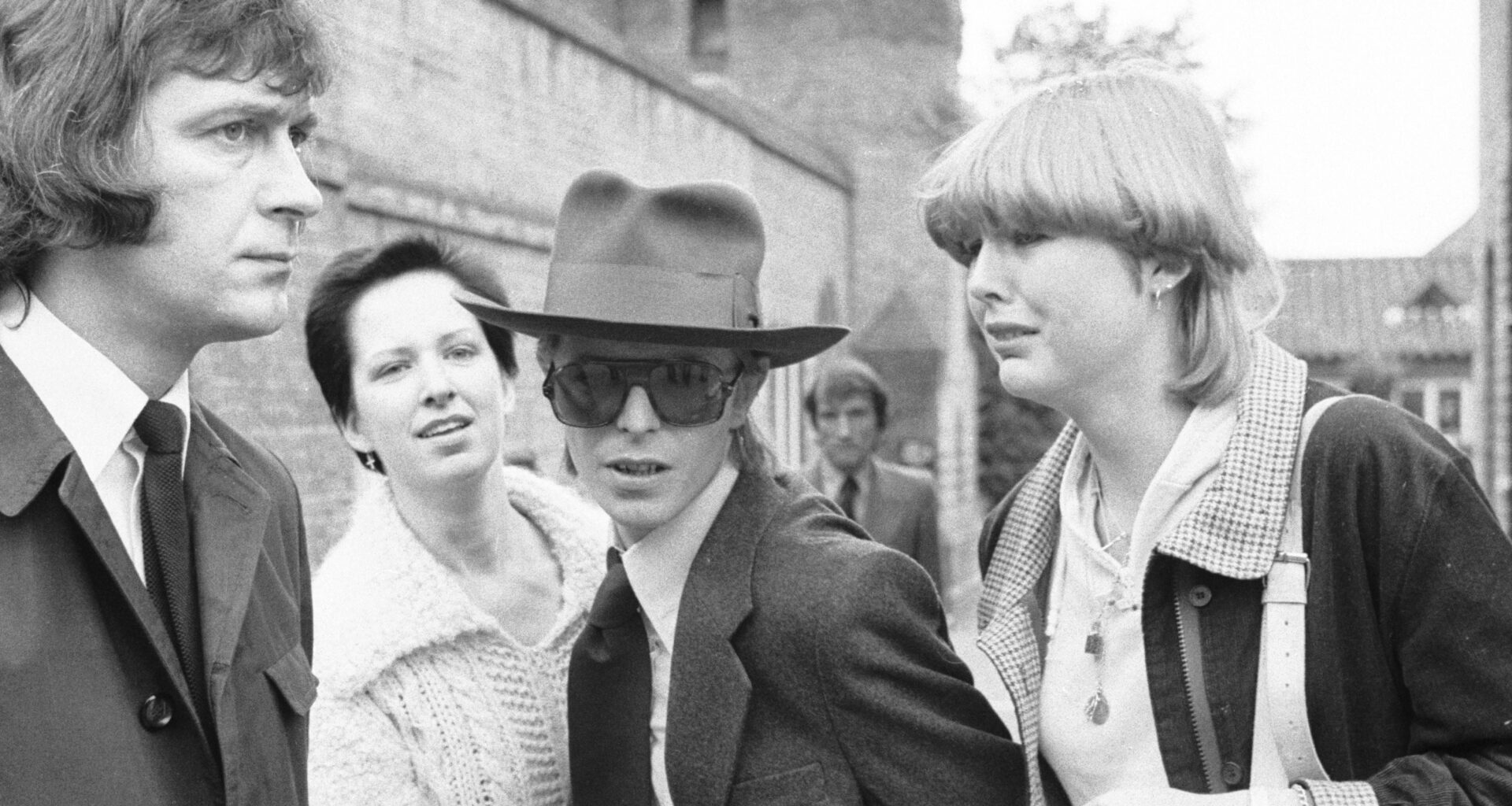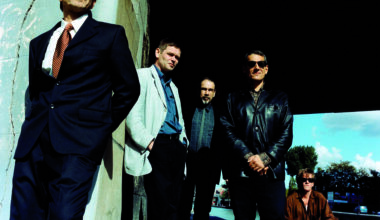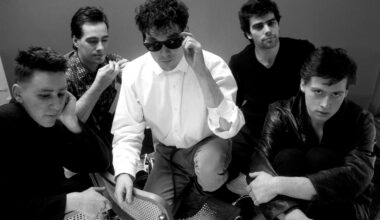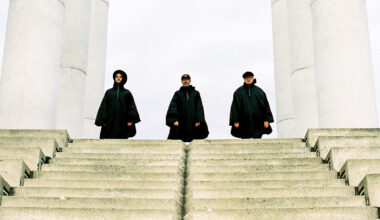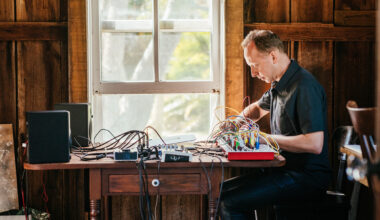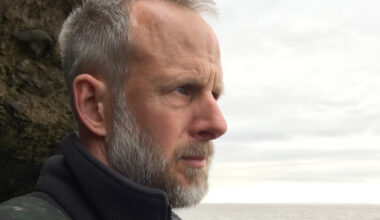Two pioneering albums, a classical music voiceover, a safari, an imposter, encounters with Blondie, Eddie & The Hots Rods and Devo and, in the midst of a bleak Berlin winter, an ill-fated film, David Bowie had reached almost terminal velocity by December 1977…
“Christmas morning, 1977. Had a long bath. Went to see and have dinner with the Bowie entourage. He gave me a smashing book on Fritz Lang.”
This brief extract from the diary of Rory MacLean, the Canadian assistant to actor and film director David Hemmings, gives a glimpse into the domestic life of David Bowie as 1977 came to close. MacLean and Hemmings were in Berlin to shoot the ill-fated ‘Just A Gigolo’, which starred Bowie as a Prussian army officer, Paul Ambrosius von Przygodski, trying (and failing) to find a place for himself in Weimar Berlin after the First World War.
“I still have that book,” says MacLean about Bowie’s Xmas gift 40 years on. Now a well-known writer and historian, MacLean’s book ‘Berlin: Imagine A City’ is an impressive history of the city.
“The party was at a place in the Grunewald,” he recalls. “There was no one else in the restaurant. I don’t know if he’d hired it or if it was closed off, but the great thing about him in Berlin was how low-key it all was. There was none of that stardom stuff which had overwhelmed him in LA.”
He remembers that the party gradually became quite raucous (“a lot of drink was consumed”), but kicks himself for not jotting down more detail in his diary. “What was I thinking?” he laughs. He remembers evenings after long days on set relaxing at Bowie’s apartment at Hauptstraße.
“Most weekends and evenings we went there, and would collapse onto his very uncomfortable low-lying 1970s armchairs and talk and listen to music.”
He recalls meeting Iggy Pop, whom he describes as “just an American guy, not at all like the persona put forward”, and listening to the many tapes and records Bowie was sent, including Kraftwerk, Tangerine Dream and demo tapes of bands.
“Everyone knew he was in Berlin,” says MacLean, “and he was accessible. Many of the tapes came from German bands.”
MacLean also witnessed Bowie writing ‘The Revolutionary’ for the ‘Just A Gigolo’ soundtrack. It was a quick sketch, knocked out at Hansa and later fleshed out by Jack Fishman, a political journalist and author with a secret sideline as a songwriter.
Incidentally, Fishman, who was born in London to Jewish refugee parents, happened to be in Berlin in 1930, aged 10, as a Nazi rally was taking place, and had his head patted by Adolf Hitler, an event he blamed for his premature baldness.
‘The Revolutionary’ was released as a single in Japan, and appeared on the ‘Just A Gigolo’ soundtrack album, but it is certainly one of Bowie’s lesser-known songs.
“It was the first time I’d seen a musician create,” says MacLean. “I was fascinated how he didn’t rely on the literal, he didn’t put words together to get the lyrics, but he just sort of conjured a tune out of the air, started playing it on the piano, and then multi-tracking it, and adding to it, and then humming on top. During the course of those few months, from him and Iggy, I learned that was how they worked.”
On the set of ‘Just A Gigolo’, Bowie looked great, dressed in the height of inter-war aristocratic Weimar fashion. With another marvellous haircut, and that beautiful face of his, he’s every inch the Prussian officer. He even carries off a German military helmet.
Given that it was only a year since his “I think Britain could benefit from a fascist leader…” comments, uttered in an interview when he was on his way back to Europe after his coke ’n’ occult sojourn in Los Angeles, the helmet was what you might call a bold look.
Indeed, as Bowie extracted himself from Los Angeles and was relocating to Berlin in the last few months of 1976, the London branch of the Musician’s Union was voting on whether to boot him out. Leading the charge was none other than Cornelius Cardew, noted communist and experimental music beacon who had studied with Stockhausen at the Studio For Electronic Music in Cologne in the late 1950s.
“When a pop star says things like they are ‘very interested in fascism’ and that Britain could ‘benefit from a fascist leader’, they’re influencing public opinion through the massive audiences of young people that such pop stars have access to,” said the MU motion passed in November 1976. “Such behaviour is detrimental to the interests of the Union, since it prepares the ground for a political system in which the Trade Union movement can be smashed, as it was in Nazi Germany. This Central London Branch therefore proposes that any member who uses his professional standing or stage act or records to promote fascism should be expelled from the Union.”
Bowie told Melody Maker that all the fascist stuff came about because he was “out of my mind, totally, completely crazed”, but 1977 would become Bowie’s year of recovery. This physical and social rehabilitation, back into both health and respectable society, was spectacularly punctuated with the release of ‘Low’ in January and ‘Heroes’ in October.
But as that 1977 Christmas dinner proceeded, with MacLean and Bowie belting out old rock ’n’ roll hits as they staggered to the basement toilet together at the end of the night, there was plenty more for Bowie to reflect on, a year chock-full of random encounters that had kept the artist formerly known as the Thin White Duke off the gak and from chalking occult symbols on people’s carpets.
‘Low’, despite RCA’s considerable misgivings at its chilly electronic experimentation (the label actually refused to release it, until it was pointed out they were legally obliged to), was a hit on its release in January, narrowly missing the US Top 10 and lodging itself at the top end of the UK charts. ’Sound And Vision’ was released as a single in February and spent 11 weeks in the UK charts, peaking at Number Three, one of the biggest hits of Bowie’s career.
As his estranged wife Angie was preparing to tread the boards in the UK, presenting a revue-style cabaret that featured her in various states of undress dancing and singing (the latter described by Melody Maker’s Allan Jones, who witnessed the spectacle at the Webbington Hotel & Country Club near Weston-Super-Mare in April, as sounding like “a parrot being disembowelled”), Bowie was looking after their son, Zowie (now Duncan), living with Iggy Pop in a modest flat, Hauptstrasse 155, Shöneberg, Berlin.
Bowie did his own shopping and went cycling. He rode a Raleigh three-gear, while Iggy’s bike was found in the courtyard of the flats, left by a previous tenant, painted yellow with black spots. West Berlin was serving as a kind of tough love therapeutic residential resort for distressed rock stars.
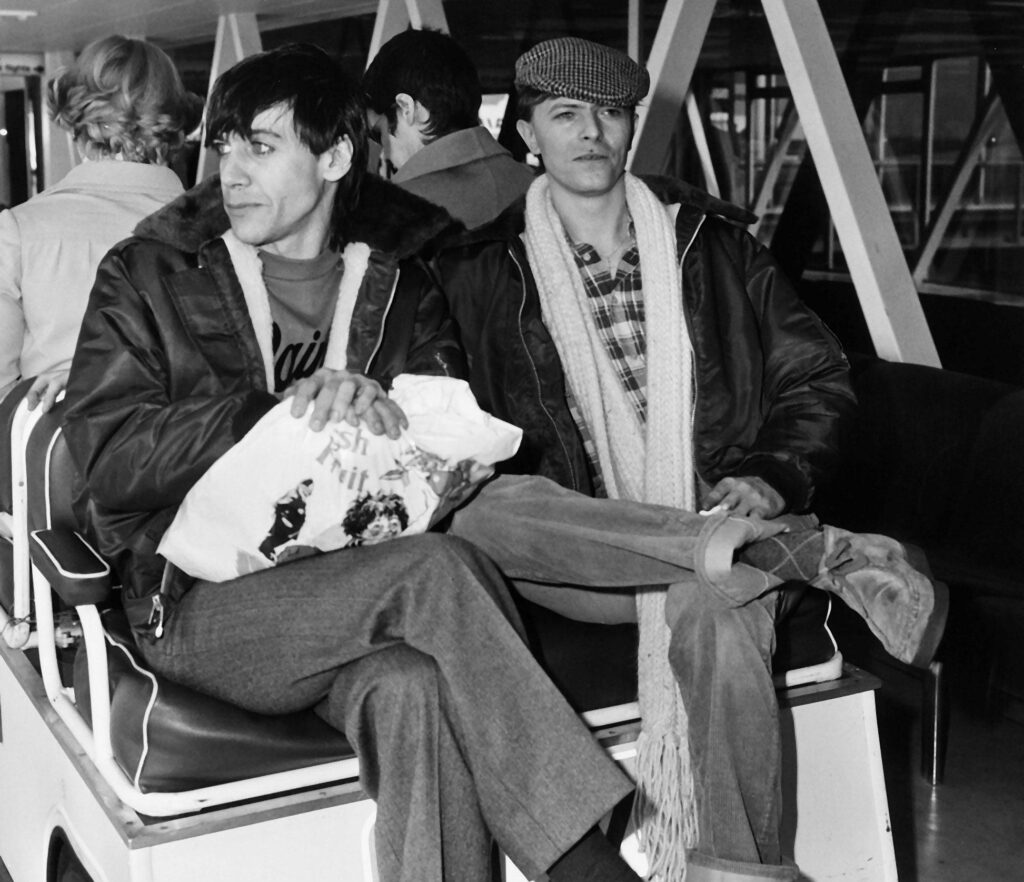
Bowie was in Berlin to work (“I have really now got the will. I will be and I will work,” he wrote in his diary), and the first big project was to attempt an incognito appearance as Iggy Pop’s keyboard player, touring to promote the Bowie-produced album, ‘The Idiot’. The album, recorded before ‘Low’ in 1976, was used by Bowie as a kind of live experiment for a new sound: ‘“A cross between James Brown and Kraftwerk” as Iggy described it.
Touring the record across the UK and the USA, starting in March, brought the pair face to face with punk and new wave. The Vibrators supported Iggy for the six UK dates, and at the London show Howard Devoto of Buzzcocks gave Bowie a copy their debut single, ‘Spiral Scratch’. In America, Blondie were the support band and at the show in Cleveland, Ohio, someone passed Bowie a demo tape of a weird, unsigned band from nearby Akron called Devo. The Sex Pistols hadn’t split up yet, but post-punk was already coming, and Bowie and Iggy were at the centre of it, helping shape it, targeted by its leading lights and seeking it out with equal enthusiasm.
In April, Bowie and Iggy were in Tokyo. They were celebrating Iggy’s 30th birthday, being interviewed, and having their photo taken by as many Japanese photographers as could fit into the press conference. They were also photographed by Masayoshi Sukita. At the hastily arranged shoot, Sukita shot the pair one after the other at the same small table in a photography studio in Tokyo’s Harajuku. Bowie wore a leather jacket, Iggy a white shirt. Shot on medium format black and white film, one of the portraits became the iconic cover of ‘Heroes’ six months later.
“The photos were meant to have a ‘punk’ feel,” Sukita recalled in his 2012 book ‘Speed Of Life’. “The whole session was over in an hour. Afterwards I selected about 20 images to give to Bowie, including the shot on the ‘Heroes’ LP sleeve. When he contacted me to say he wanted to use it, I was delighted. Later in the year I had a call from Mika of the Sadistic Mika Band. She was in London and phoned to tell me that ‘Heroes’ had been voted Melody Maker’s best cover image of the year. I was very proud.”
After ‘The Idiot’ tour, Bowie and Iggy hunkered down at Hansa Studio in Berlin to knock out another Iggy Pop album, perhaps the defining release of his career, ‘Lust For Life’. Iggy’s smiling face on the cover contrasted with the contorted pose he adopted on ‘The Idiot’. Berlin and Bowie, the message seemed to be, was doing him the world of good.
With ‘Lust For Life’ in the can, Bowie was in Paris in June. He visited the studio of artist Victor Vasarely, the father of Op-Art, whose painting had provided the backdrop to Bowie’s 1969 “official” debut album (actually his second). Vasarely’s work had adorned 1960s releases by Xenakis and Stockhausen, but on Bowie’s album he was credited as Vaserelli, such was the state of fact checking in the 1960s music biz (see also the misspelling of the Berlin district Neukölln on ‘Heroes’ as “Neuköln”).
Over the summer, Bowie also shot a promo video for ‘Be My Wife’ in Paris, the second single lifted from ‘Low’.
The director was Stanley Dorfman, who would also shoot the video for ‘Heroes’. Dorfman had been the original ‘Top Of The Pops’ director, ending up making pop music shows after a career as an artist. He’d studied at the Paris École des Beaux-Arts and Académie Julian in the 1940s and then became part of the St Ives School alongside Barbara Hepworth.
As the summer days lengthened, Bowie returned to Berlin and Hansa Studios with Brian Eno and Tony Visconti to record the ‘Heroes’ album. By August, it was finished, and on Wednesday 7 September, Bowie was back in the UK, giving ‘Heroes’ the kind of high energy promotion he didn’t afford ‘Low’.
He headed to Manchester to record a performance of ‘Heroes’ for Marc Bolan’s ITV children’s show ‘Marc’. In jeans and blue shirt open at the neck, Bowie gave a full-throated rendition of the song to a re-recorded backing track featuring a particularly attention- seeking bassline courtesy of Herbie Flowers. The recording ended in chaos as the crew downed tools with more performances to shoot, specifically Eddie & The Hot Rods who’d been kicking their heels all day waiting to get in front of the cameras, only to be told they weren’t going to appear.
“It all kicked off,” remembers Eddie & The Hot Rods frontman Barrie Masters. “We’d spent all day waiting to record and then we went a bit mental. Our tour manager started smashing the light bulbs around the mirrors in the dressing room.”
When the band got to the train station to head back to London, there were “thousands of kids on the platform, all screaming,” says Masters. “We thought, ‘Bloody hell, we’re more popular than we thought we were’.”
Once settled in their compartment, the Rods were greeted by “two suits” as Masters describes them. “‘You’re the Hot Rods, right?’ they said. ‘David wants to know if you’d like something to eat.’ They led us next door and there he is, with a cardboard box, pulling out loads of bread, cheese and wine. ‘Hello boys!’ he says. ‘Fancy some lunch?’.”
Despite being in awe of Bowie, Masters found himself so relaxed in his company that he was soon challenging him.
“He said something about some bollocks, and all of sudden I hear myself saying, ‘Hold on, mate, how can you believe that bullshit?’. I’m thinking to myself, ‘Shut the fuck up! You’re talking to David Bowie!’. But he put you right at ease. He had this lovely way about him, you couldn’t help but like the old feller.”
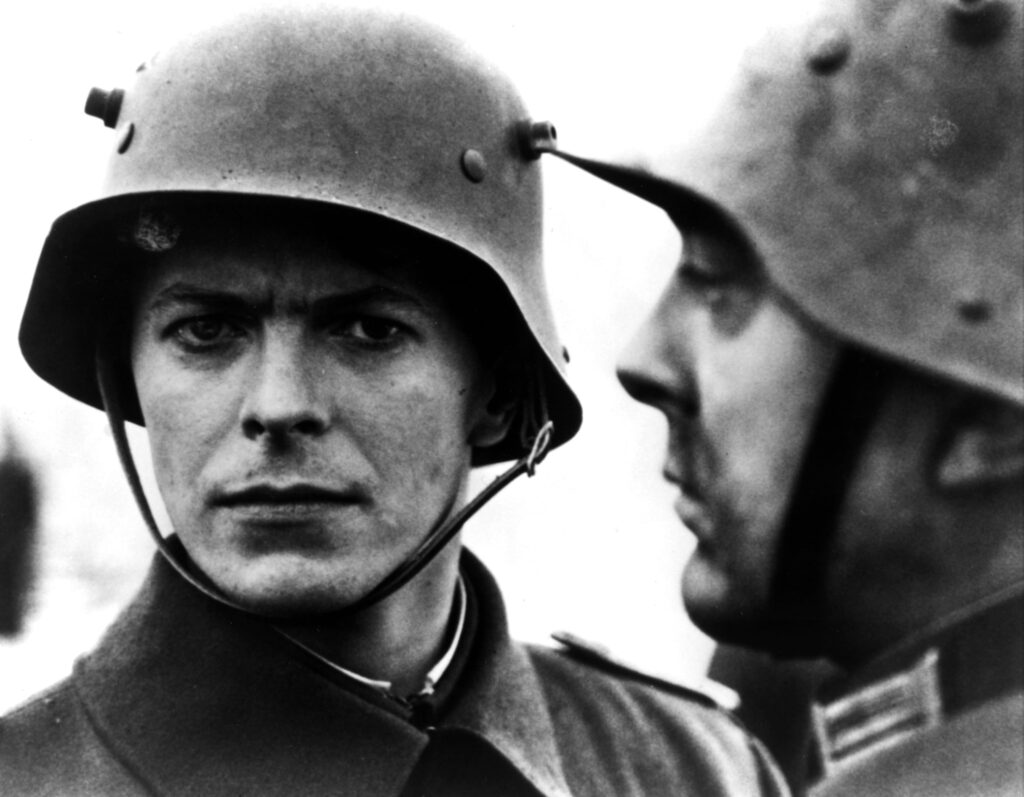
Bowie lamented that while the Hot Rods could pop to the pub for pint, or grab a bacon sarnie from a cafe, he couldn’t do any of those things.
“I think he missed it, the normal life,” says Masters. “We were a connection to that, I suppose. He seemed keen for us not to leave. If a couple of us stood up, he’d get up and say, ‘Where are you going, lads?’. He didn’t want people to go. I suppose a lot of people he met didn’t treat him like a normal person, they’d be gibbering.”
Barrie Masters never forgot the encounter and, despite the fact that Bowie “never gave us his number or nothing”, Bowie didn’t forget to Hot Rods, either. The following year the band played a festival in Geneva, and there was a telegram from Bowie wishing them luck for the show.
“That happened a few times,” says Masters. “He’s got to be a kind guy to bother looking up where we were playing and send a note.”
Masters has one memento from that impromptu picnic on a train in September 1977, a paper plate signed by Bowie.
“It’s a prized possession,” he says.
As the year’s end came into view, and ‘Heroes’ was readied for release on 14 October, the tempo surrounding Bowie picked up.
The day after the Bolan TV recording, Iggy Pop’s ‘Lust For Life’ was released, but it was overshadowed by the death of Elvis Presley a few weeks earlier. RCA’s presses were churning out Elvis back catalogue, meaning that once the initial pressing of ‘Lust For Life’ sold out, it was at the back of the queue for a second pressing. Demand outstripped supply and the album’s initial strong chart showing faded quickly.
But Bowie had other fish to fry. On Sunday 11 September, he was at Elstree to record another TV show. Bing Crosby’s ‘Merrie Old Christmas’ TV special, due for broadcast on Christmas Eve in the UK, would include the famously unlikely duet between your gran’s favourite crooner and the most cutting edge pop star on the planet singing ‘Little Drummer Boy’/‘Peace On Earth’, a mash-up put together at the last minute when Bowie announced how much he despised ‘Little Drummer Boy’.
”It was the most bizarre experience,” Bowie later said. “I was wondering if he was still alive.”
In fact, Crosby died a month later, before the special was broadcast. Bowie’s pained rendition of ‘Heroes’ in an otherwise cosy Christmas telly special was the one square peg in Bing’s Christmas tree-shaped hole. While the duet itself, it’s fair to say, divides opinion among Bowie fans.
Just a few days after the Bowie ’n’ Bing show, on Friday 16 September, Marc Bolan died when the car he was in collided with a tree near Barnes, west London. The funeral was held at Golders Green cemetery on 20 September. Bowie flew in from Switzerland for the funeral, distraught at the loss of his old friend. Afterwards he had his driver take him on nostalgic tour of his old homes in Brixton and Haddon Hall in Beckenham.
In October, Bowie was toying with the prospect of playing artist Egon Schiele in a film, working title ‘Wally’, a project slated to be directed by Clive Donner (‘What’s New Pussy-cat?’ and ‘Here We Go Around The Mulberry Bush’ were a couple of his better known films), which came to nothing, and the rest of the month was a blur of promotional interviews and TV appearances, with ‘Heroes’ being released on 14 October. The same day Bing Crosby died, aged 74.
Following the release of ‘Heroes’, Bowie became embroiled in a truly eccentric sideshow when someone claiming to be Bowie turned up in San Francisco, tipping lavishly in restaurants and buying expensive wine for fellow diners. The San Francisco Chronicle ran the story, which was picked up around the US by smaller newspapers.
“Someone looking an awful lot like David Bowie raised quite a ruckus in San Francisco” the Florida Today newspaper wrote at the time. “He registered at the conservative Clift Hotel as ‘Shannon van Cleve of Pink Floyd’, and reportedly left $250,000 in $100 bills in the hotel’s safety deposit vault (although no one at the hotel could confirm having actually seen the money). The ersatz Bowie also dropped into Lord Jim’s, a local bar, where he is said to have tipped the staff with some of the aforementioned $100 bills. Some further nosing about found a fellow, who fitted Bowie’s description and identified himself as Bowie, having lunch at the Fairmont Hotel’s Squire Room. Asked if he always kept such large amounts of cash, he replied, ‘Yes. How else am I supposed to carry it? In traveller’s cheques? Then everyone would know who I am. People could try to blow me away, knowing the amount of money I carry with me’.”
According to the Chronicle’s Carol Vernier, Bowie called the paper’s gossip columnist Herb Caen from Amsterdam to renounce the imposter, and was “livid” about the story, threatening the paper with lawyers. He claimed the Bowie impersonator “ran off with some film producer’s wife and $500,000 of his money”. A sly publicity stunt to create Bowie-related column inches, perhaps? Churning out publicity-seeking bullshit via gossip columns was certainly not new territory for Bowie. In 1984, he claimed that the perpetrator got the idea in reform school where “his cellmate was a Jimi Hendrix clone”. Just how did Bowie know that snippet, we wonder.
On 19 October, Bowie recorded a live vocal at the ‘TOTP’ studio over yet another new ‘Heroes’ backing track, this one recorded by Visconti at his Good Earth studio in London with Ricky Gardiner, who’d played on ‘Low’, taking Fripp’s part and Visconti playing bass.
Shortly after that, he managed to squeeze in a trip to Kenya for a safari with Zowie before emerging on stage in New York at Max’s Kansas City on 14 November to introduce Devo. “This is the band of the future!” he proclaimed, an honour he would also bestow on The Human League.
“After our first set, he came back stage and said he wanted to take us to Tokyo at Christmas to produce our debut album,” remembers Devo frontman, Mark Mothersbaugh. “And we’re like, ‘Tokyo sounds great, we’re sleeping in a van tonight!’.”
Mothersbaugh also reveals Bowie invited him and Devo co-founder Jerry Casale to stay at his New York hotel for a couple days.
“It was a pretty nice hotel,” he says. “I’d never stayed in a nice hotel before. One night he took us out to see Mummenschanz, a Swiss mime/dance troupe. A couple of people saw him when we walked in the theatre and when we came out there was a mob scene waiting for him.
“His bodyguard rushed us into the back of this car, and David is sitting next to me. He pulls his hat down over his face and slouches down, and he looks like the Thin White Duke. These people are pounding on the window looking in, shouting his name, and I’m on the other side of the window, looking at them going, ’It’s David Bowie!’.”
Bowie also enlightened Devo about food on the two-day rock star induction course.
“He took us to a sushi bar,” says Mothersbaugh. “I had no idea. We go in, they brought this stuff out, and he says, ‘It’s raw fish’. I look at the menu and it’s not cheap, like a couple of dollars a piece, and I’m thinking, ‘Why would you pay two dollars to eat a piece of raw fish?’. I watched him take chopsticks – he knew how to work ’em – and he dipped a piece of sushi in the soy and put in his mouth, and he says, ‘Do it!’. I did it, but only because it was David Bowie, if it wasn’t for David Bowie I wouldn’t have tried it. I was like, ‘That’s the weirdest thing I’ve ever eaten’. It was the first time I realised food is an art form all on its own, so he opened up that world to me too.”
Bowie’s patronage certainly fuelled the Devo fire, but he was talking about having to work on the film ‘Just A Gigolo’ in December which, he said, might make it difficult for him to produce their debut album that winter after all. And sure enough, it was the film that occupied Bowie from 1 December for the next 53 days.
Given his accelerating work rate, there was still time before filming started to record his narration for Prokofiev’s ‘Peter And The Wolf’ in New York, and to perform best man duties at his driver Tony Mascia’s wedding (Mascia appeared on screen as Thomas Newton’s driver in ‘The Man Who Fell To Earth’).
As Bowie’s 1978 got up a head of steam, ‘Just A Gigolo’ was being edited, and re-edited, and edited again. If you’ve seen it, especially if you caught it on its cinematic release in 1978 in Berlin (or the hastily recut 1979 UK version) you’ll be familiar with the peculiar sense of dissonance it induces. Depending on which version you watch, it’s either a long mess, or a shorter mess.
Here was David Bowie, last seen on screen in the masterful ‘The Man Who Fell To Earth’, who’d just released two albums of astonishing experimentation and daring, playing the lead in a film with the aesthetics of a high-budget porno that didn’t seem to know if it was a broad comedy or an art film. It ended up looking like ‘Carry On Up The Weimar’. While it was a debacle, it’s not quite as appalling as its reputation would have you believe. Bowie’s boyish charm is on full beam throughout, but he was keen to distance himself from it with his trademark good humour.
“It was my 32 Elvis Presley movies rolled into one,” he said in 1980. What could have been a great cinematic memorial to his Berlin period turned out to be a embarrassing disaster.
“It was a lost opportunity,” sighs Rory MacLean. “If there was a singular vision, Hemmings didn’t stick with it.”
It was the same story with Hemmings’ tour film Bowie paid him to make (before seeing the finished ‘Just A Gigolo’ we have to assume) in the summer of 1978, which remains unreleased.
“Hemmings wasn’t interested in David’s music,” says MacLean. “He made a very literal film. He used stock films of dolphins during ‘Heroes’, and period footage of trains right at the beginning of ‘Station To Station’.”
By 1978, Bowie was back to full health and starting a triumphant world tour. His patronage of Devo helped launch them into new wave notoriety and enduring cult status, and he started work on ‘Lodger’, the last of his Berlin “triptych”. The world tour finally came to an end in December in Japan, and Bowie celebrated Christmas 1978 in Kyoto.
As he told Charles Shaar Murray in November, 1977: “I don’t live anywhere. I’ve never got around to getting myself a piece of land, putting up a house on it and saying this is mine, this is home. If I did that, that would just about ruin everything.”
The David Bowie boxset, ‘A New Career In A New Town (1977 – 1982)’, is out on Parlophone
